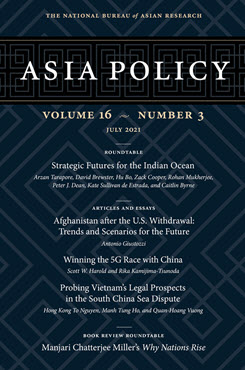Probing Vietnam’s Legal Prospects in the South China Sea Dispute
This article reviews dispute settlement procedures under the 1982 United Nations Convention on the Law of the Sea (UNCLOS), discusses the application in two cases, and draws implications for the actionable legal procedures available to Vietnam.
EXECUTIVE SUMMARY
MAIN ARGUMENT
Although most Asian states are signatories to UNCLOS, which offers options for dispute resolution by either voluntary or compulsory processes, in reality fewer than a dozen Asian states have taken advantage of such an approach. The decision to adopt third-party mechanisms comes under great scrutiny and deliberation, not least because of the entailing legal procedures and the politically sensitive nature of disputes. Vietnam claims the second-largest maritime area in the South China Sea dispute after China. A comparison of two recent cases—the arbitration between the Philippines and China and the conciliation between Timor-Leste and Australia—highlights the importance of selecting between binding and nonbinding decisions and framing a complaint. In particular, any legal action under UNCLOS should specify China’s claims and actions in areas that encroach on Vietnam’s claimed exclusive economic zone (EEZ) and violate international law.
POLICY IMPLICATIONS
- Were Vietnam to build a case against China in the South China Sea based on maritime entitlements, rather than boundary delimitation, it should initiate a compulsory arbitration procedure pursuant of Article 287 and Annex VII of UNCLOS. In taking this step, Vietnam should seek a ruling regarding (1) entitlements to living and nonliving resources in its EEZ and continental shelf and (2) the legality of China’s claims and activities in the South China Sea.
- While Vietnam continues to prefer negotiations, the growing assertiveness of China, including its activities in Vietnam’s claimed EEZ, may change this calculation. A potential victory in international arbitration could secure Vietnam’s sovereignty over its EEZ and continental shelf.
Hong Kong To Nguyen is a MEXT Scholar pursuing a doctoral degree in international relations at Ritsumeikan Asia Pacific University (Japan). She is also a researcher affiliated with the Centre for Interdisciplinary Social Research at Phenikaa University (Vietnam). Ms. Nguyen holds a BA in philosophy and political science from Columbia University and an MSc in international relations from Ritsumeikan Asia Pacific University.
Manh Tung Ho is a Research Fellow with the project “Emotional AI in Cities: Cross Cultural Lessons from UK and Japan on Designing for an Ethical Life,” funded by the JST-UKRI Joint Call on Artificial Intelligence and Society in 2019. He also is a researcher at the Centre for Interdisciplinary Social Research at Phenikaa University (Vietnam). Mr. Ho holds an MSc in society, culture, and media studies from Ritsumeikan Asia Pacific University.
Quan-Hoang Vuong is the Director of the Centre for Interdisciplinary Social Research at Phenikaa University (Vietnam). He is the chairman of the Vietnam chapter of the European Association of Science Editors. His main interests are the applications of probability and statistics in economics, management, social medicine, sociocultural systems, and the philosophy of science. He has published more than 160 papers and books with many leading academic publishers.
About Asia Policy
Asia Policy is a peer-reviewed scholarly journal presenting policy-relevant academic research on the Asia-Pacific that draws clear and concise conclusions useful to today’s policymakers. Asia Policy is published quarterly in January, April, July, and October and accepts submissions on a rolling basis. Learn more


